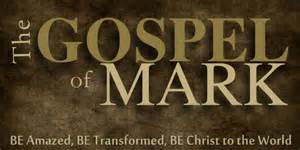
"Can one feed these with bread here in the desert?"
Scripture: Mark 8:1-10
1 In those days, when again a great crowd had gathered, and they had nothing to eat, he called his disciples to him, and said to them, 2 "I have compassion on the crowd, because they have been with me now three days, and have nothing to eat; 3 and if I send them away hungry to their homes, they will faint on the way; and some of them have come a long way." 4 And his disciples answered him, "How can one feed these men with bread here in the desert?" 5 And he asked them, "How many loaves have you?" They said, "Seven."6 And he commanded the crowd to sit down on the ground; and he took the seven loaves, and having given thanks he broke them and gave them to his disciples to set before the people; and they set them before the crowd. 7 And they had a few small fish; and having blessed them, he commanded that these also should be set before them. 8 And they ate, and were satisfied; and they took up the broken pieces left over, seven baskets full. 9 And there were about four thousand people.10 And he sent them away; and immediately he got into the boat with his disciples, and went to the district of Dalmanu'tha.
Meditation: Can anything on earth truly satisfy the hunger we experience for God? The enormous crowd that pressed upon Jesus for three days were hungry for something more than physical food. They hung upon Jesus’ words because they were hungry for God. When the disciples were confronted by Jesus with the task of feeding four thousand people many miles away from any source of food, they exclaimed: Where in this remote place can anyone get enough bread to feed them? The Israelites were confronted with the same dilemma when they fled Egypt and found themselves in a barren wilderness. Like the miraculous provision of manna in the wilderness, Jesus, himself provides bread in abundance for the hungry crowd who came out into the desert to seek him. The gospel records that all were satisfied and they took up what was leftover. When God gives he gives abundantly -- more than we deserve and more than we need. He nourishes us with his life-giving word and with the bread of heaven.
The sign of the multiplication of the loaves when the Lord says the blessing, breaks and distributes through his disciples prefigures the superabundance of the unique bread of his Eucharist or Lord’s Supper. When we receive from the Lord’s table we unite ourselves to Jesus Christ, who makes us sharers in his body and blood. Ignatius of Antioch (35-107 A.D.) calls it the "one bread that provides the medicine of immortality, the antidote for death, and the food that makes us live for ever in Jesus Christ" (Ad Eph. 20,2). This supernatural food is healing for both body and soul and strength for our journey heavenward. When you approach the Table of the Lord, what do you expect to receive? Healing, pardon, comfort, and rest for your soul? The Lord has much more for us, more than we can ask or imagine. The principal fruit of receiving the Eucharist is an intimate union with Christ. As bodily nourishment restores lost strength, so the Eucharist strengthens us in charity and enables us to break with disordered attachments to creatures and to be more firmly rooted in the love of Christ. Do you hunger for the bread of life?
"Lord, you alone can satisfy. Fill me with gratitude and longing for the true bread of heaven which gives strength and healing for body and soul.”